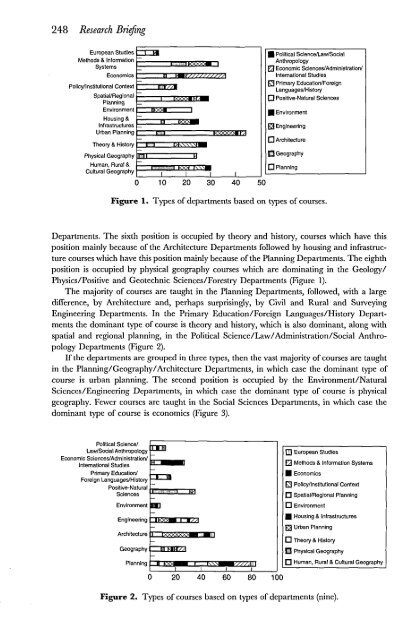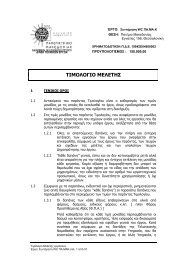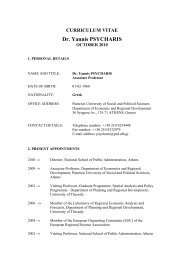The development of planning education and its relation to the ...
The development of planning education and its relation to the ...
The development of planning education and its relation to the ...
You also want an ePaper? Increase the reach of your titles
YUMPU automatically turns print PDFs into web optimized ePapers that Google loves.
248 Research Briefing<br />
European Studies<br />
Methods & Information<br />
Systems<br />
Economics<br />
Policy/Institutional Context<br />
Spatial/Regional<br />
Planning<br />
Environment<br />
Housing &<br />
Infrastructures -<br />
Urban Planning<br />
-<br />
<strong>The</strong>ory & His<strong>to</strong>ry<br />
Physical Geography<br />
Human, Rural &<br />
Cultural Geography<br />
zoa<br />
-<br />
-<br />
-<br />
— 1<br />
Pill<br />
mm//<br />
I<br />
n<br />
1<br />
i<br />
IXX>G<br />
•<br />
n<br />
hxxxx>« vA<br />
• Planning<br />
1 1 i 1<br />
10 20 30 40 50<br />
• Political Science/Law/Social<br />
Anthropology<br />
0 Economic Sciences/Administration/<br />
International Studies<br />
0 Primary Education/Foreign<br />
Languages/His<strong>to</strong>ry<br />
• Positive-Natural Sciences<br />
B Environment<br />
0 Engineering<br />
• Architecture<br />
HI Geography<br />
Figure 1. Types <strong>of</strong> departments based on types <strong>of</strong> courses.<br />
Departments. <strong>The</strong> sixth position is occupied by <strong>the</strong>ory <strong>and</strong> his<strong>to</strong>ry, courses which have this<br />
position mainly because <strong>of</strong> <strong>the</strong> Architecture Departments followed by housing <strong>and</strong> infrastructure<br />
courses which have this position mainly because <strong>of</strong> <strong>the</strong> Planning Departments. <strong>The</strong> eighth<br />
position is occupied by physical geography courses which are dominating in <strong>the</strong> Geology/<br />
Physics/Positive <strong>and</strong> Geotechnic Sciences/Forestry Departments (Figure 1).<br />
<strong>The</strong> majority <strong>of</strong> courses are taught in <strong>the</strong> Planning Departments, followed, with a large<br />
difference, by Architecture <strong>and</strong>, perhaps surprisingly, by Civil <strong>and</strong> Rural <strong>and</strong> Surveying<br />
Engineering Departments. In <strong>the</strong> Primary Education/Foreign Languages/His<strong>to</strong>ry Departments<br />
<strong>the</strong> dominant type <strong>of</strong> course is <strong>the</strong>ory <strong>and</strong> his<strong>to</strong>ry, which is also dominant, along with<br />
spatial <strong>and</strong> regional <strong>planning</strong>, in <strong>the</strong> Political Science/Law/Administration/Social Anthropology<br />
Departments (Figure 2).<br />
If <strong>the</strong> departments are grouped in three types, <strong>the</strong>n <strong>the</strong> vast majority <strong>of</strong> courses are taught<br />
in <strong>the</strong> Planning/Geography/Architecture Departments, in which case <strong>the</strong> dominant type <strong>of</strong><br />
course is urban <strong>planning</strong>. <strong>The</strong> second position is occupied by <strong>the</strong> Environment/Natural<br />
Sciences/Engineering Departments, in which case <strong>the</strong> dominant type <strong>of</strong> course is physical<br />
geography. Fewer courses are taught in <strong>the</strong> Social Sciences Departments, in which case <strong>the</strong><br />
dominant type <strong>of</strong> course is economics (Figure 3).<br />
Political Science/<br />
Law/Social Anthropology<br />
Economic Sciences/Administration/<br />
International Studies<br />
Primary Education/<br />
Foreign Languages/His<strong>to</strong>ry<br />
Positive-Natural<br />
Sciences<br />
Environment<br />
Engineering<br />
Architecture<br />
Geography<br />
Planning<br />
1 I HI<br />
~r~m<br />
mi<br />
-<br />
H VKl/A<br />
II 1<br />
20<br />
BTT<br />
40 60 80 100<br />
fj] European Studies<br />
E3 Methods & Information Systems<br />
I<br />
Economics<br />
0 Policy/Institutional Context<br />
• Spatial/Regional Planning<br />
n<br />
Environment<br />
B Housing & Infrastructures<br />
^<br />
Urban Planning<br />
• <strong>The</strong>ory & His<strong>to</strong>ry<br />
^<br />
Physical Geography<br />
• Human, Rural & Cultural Geography<br />
Figure 2. Types <strong>of</strong> courses based on types <strong>of</strong> departments (nine).






